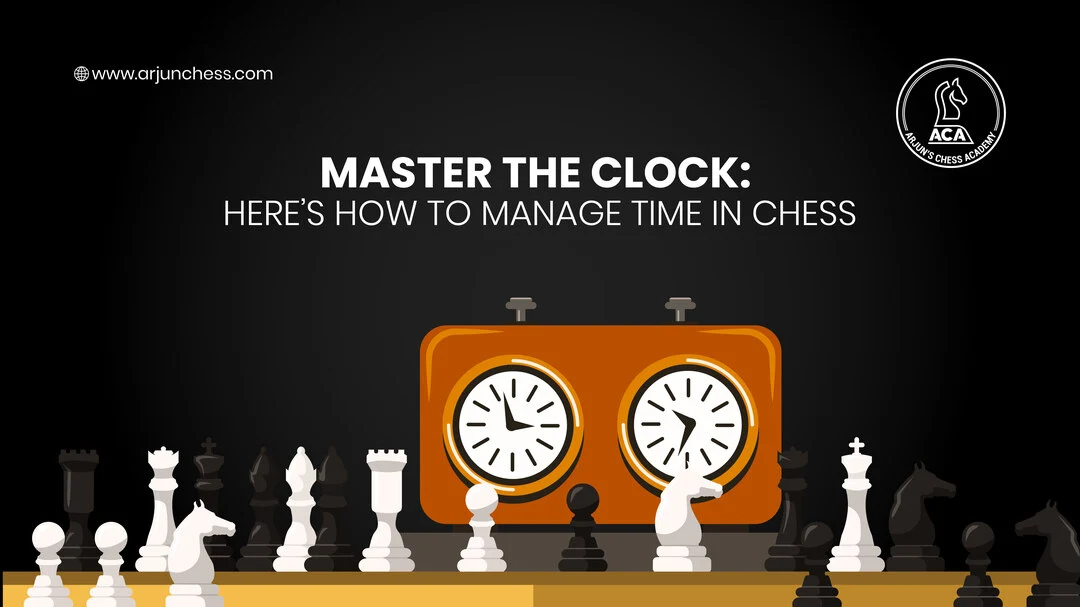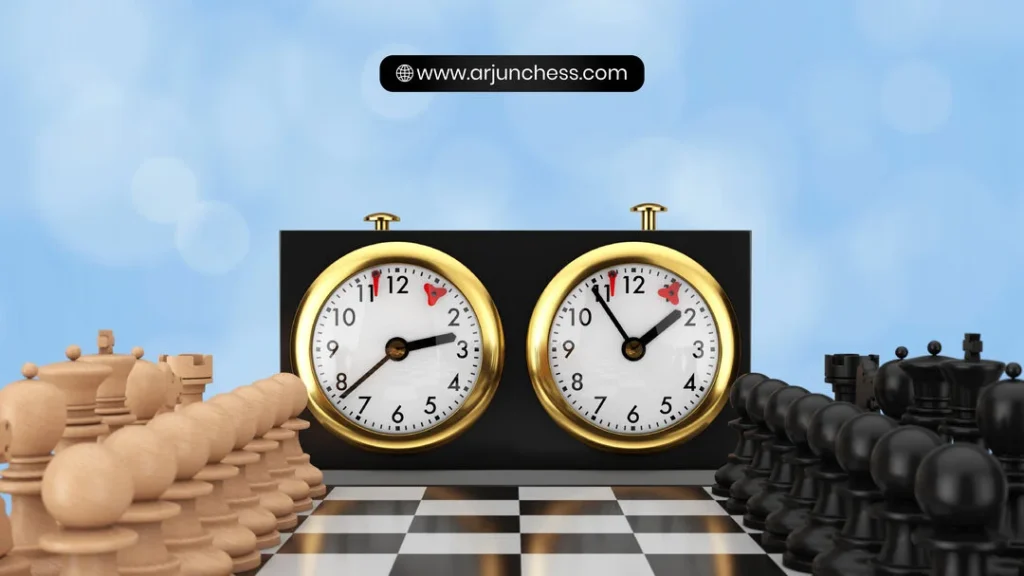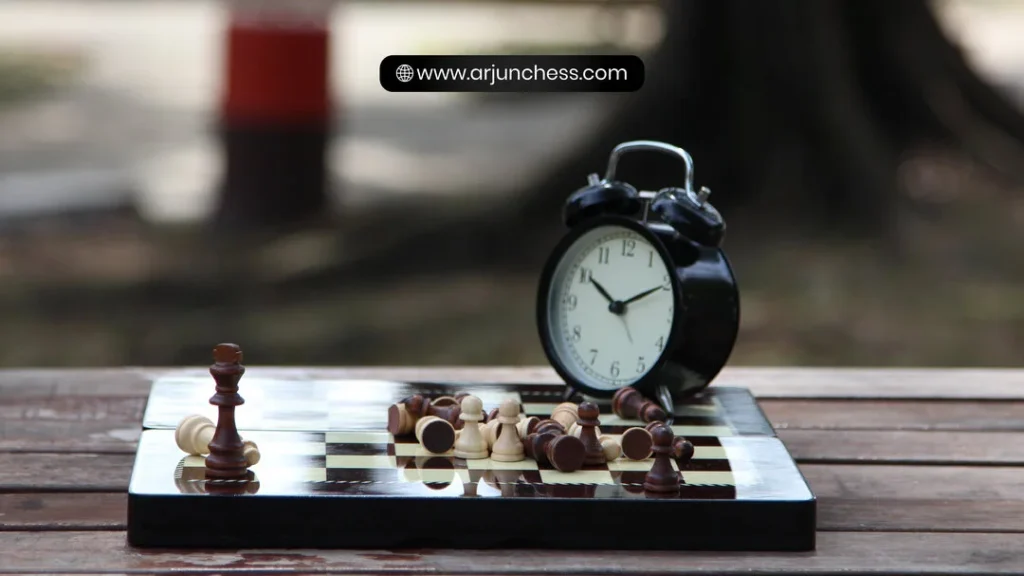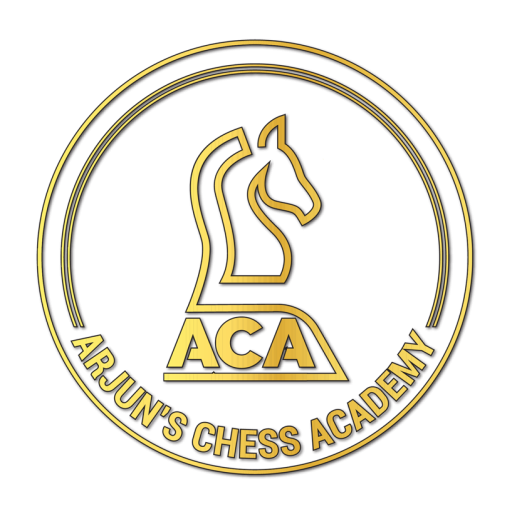
Master the Clock: Here’s How to Manage Time in Chess
Chess is a game of immense complexity, with countless possible moves and variations. In chess, time is more than just a ticking clock. Effective time management helps players navigate this complexity, ensuring they have enough time to analyse positions thoroughly and make the right moves.
Smart strategies and well devised moves at the perfect time makes you a winner. Come explore how that’s done!
Tame the Chess Clock with Master Moves
Time management in chess is what distinguishes a seasoned chess player from the rest of the pack. The game’s dynamic nature demands precise allocation of time.
The Chess Clock divides a game into finite segments, adding intensity and strategy. It governs the pace and pressure of play. Every move is a race against time, with players compelled to make strategic decisions swiftly yet thoughtfully. The chess clock’s relentless countdown forces strategic trade-offs, compelling players to balance analysis and action.
Mastering time management not only enables us to control the tempo of our game but be calm and composed even when there isn’t enough time.
Manage Time Like A Pro: Beginner's Guide to Time Management in Chess
Mastering time management in chess is an essential skill for players of all levels. Being equipped with skills to play with a chess clock helps to get better at this.
How to set up and use a chess clock might be puzzling for beginners. Scroll down to know it!
- Start by placing the clock between players with the buttons facing each player.
- Set the initial time allocation for each player, typically 60 minutes per player for longer games.
- When it’s your turn, press your button to start your opponent’s timer and stop it when your move is completed.
This simple yet crucial process not only ensures fair play but also adds urgency to decision-making, enhancing strategic thinking. By following these steps and familiarizing oneself with the chess clock, beginners can gain confidence in managing time effectively, ultimately improving their game and enhancing the joy of playing it.

Get the Best of Speed & Precision: Strategies to Boost Your Game
In chess, timely moves dictate who the winner is. Three fundamental strategies underpin effective time management:
- Firstly, priorities your moves by identifying critical junctures where deeper analysis is warranted, allocating more time accordingly.
- Secondly, maintain a steady pace throughout the game, avoiding impulsive moves while ensuring timely responses to your opponent’s threats.
- Lastly, anticipate your opponent’s plans, utilising their thinking time to plan your next moves, gaining a tactical advantage. In chess, the delicate balance between precision and speed is paramount.
While swift decisions are necessary to maintain momentum in Chess, each move demands meticulous calculation to avoid pitfalls. This balance sets the tone for strategic gameplay, where players navigate the chessboard with foresight and finesse. By mastering time management strategies, players harness the power of the clock, not merely as a constraint but as a catalyst for strategic brilliance, shaping the outcome of each move and ultimately the game itself.
There’s no one size that fits all formats in chess. We at Arjun’s Chess Academy prioritizes effective strategies tailored to individual needs, ensuring all students grasp necessary skills to manage time efficiently by allocating time wisely at every step.
Committed to nurturing talent, we emphasize the balance between precision and speed, instilling in our players the ability to make timely yet thoughtful decisions. Through personalized coaching and comprehensive training modules, we empower our students to harness the power of the clock, enhancing their strategic prowess and elevating their gameplay to new heights. At Arjun Chess Academy, mastering time management isn’t just a skill— it’s a gateway to success on the chessboard. Make effective strategies your mate with Arjun’s Chess Academy
These competencies seamlessly translate past the chessboard, proving priceless in lifestyles planning, profession approach, and economic choice-making. In the world of business, the ability to strategize and expect outcomes is honed through chess, presenting a strategic gain. Whether navigating profession choices or economic dreams, the lessons found out at the chessboard turn out to be powerful equipment for fulfilment within the strategic recreation of lifestyles.
Foster Your Love for Chess with Right Time Management Strategies
If you want to excel in Chess, you must learn to manage time efficiently during the game. While passion inspires to play the game, it’s equally important to be smart with the time you have at hand during the game. Here’s a set of time management strategies tailored for young players.
- Allocate time wisely during play. Prioritizing moves based on their significance can prevent wasting precious minutes on less impactful decisions.
- Anticipate opponents’ responses during the game rather than focusing only on one’s own moves. This can aid in planning and executing moves swiftly.
- Practice time controls regularly. Sharpening time management skills through consistent practice helps to make decisions under pressure while staying within time constraints.
By mastering these strategies, young players not only enhance their chess skills but also develop a deeper appreciation for the game. You learn to embrace the strategic challenges and thrilling dynamics of timed matches, fostering a love for chess rooted in both intellectual stimulation and competitive spirit. Effective time management enhances both confidence and enthusiasm of the players.

Master Precision and Boost Your Confidence: Step-by-Step Guide for Chess Clock Setup
When it comes to timed games, setting up the chess clock is a crucial step. Big tasks don’t have to be a hassle. Follow these quick and easy steps:
- Begin by placing the clock between players.
- Ensure both sides of the clock are visible.
- Decide on time controls for each player. Set the desired time for each player by adjusting the dials.
- Ensure both sides are synchronized.
- Press the clock’s buttons simultaneously to start.
- The opponent’s time starts while their clock is running.
- After making a move, press the button to stop your clock.
- It’s the opponent’s turn when your clock stops.
- The game ends when one player’s time runs out.
Familiarity breeds confidence. Do not give up on your first few attempts. Regular practice with this setup will enhance your game skills.
If unsure, practice with no pressure and try again. This step-by-step guide will boost your confidence, making chess clock setup a seamless part of your game.
Seize the Time: Here’s What You Need for Your Chess Journey
There are some critical moments in chess games. It will determine your position and distinguish you from the rest. Time is your biggest ally in these moments, which is why it’s important to befriend it and master it for opportunistic use. All it takes is right guidance and consistent practice. Arjun’s Chess Academy is here to make it happen!
Remember, every move is an opportunity to apply your learned strategies, balancing precision and speed. Embrace the challenges and rewards of timed matches, knowing that your efforts will enhance both your confidence and enthusiasm for the game. Mastering time in chess is a promise to be a bigger and better chess player.

By

